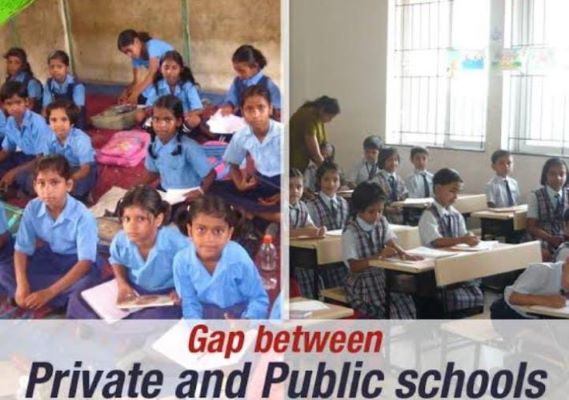
The education system so developed in Pakistan is creating a sense of social inequality amongst the parents who cannot afford to send their children to private schools
Ammarah Shaikh
It is a universally recognized fact that the education plays a critical role in socio-economic development of an individual and the nation, as it improves human capabilities and accelerates economic growth through knowledge and skills. However, in Pakistan, the situation has become precarious as the public sector educational institutions have failed to maintain quality, the education in private sector has become a commercial venture and is being sold like commodity.
The education provided by public sector is less expensive then private sector but as the private sector service providers are generally dynamic, the parents want comprehensive education for their children.
Such a trend has turned the education in Pakistan a market commodity sold by the private sector. The parents think that private schools use modern and up to date technology in teaching. Moreover, most of the private schools have their own curricular and majority of private institutions are English medium which attract the parents and make them to pay high fees. Also, the parent’s educational and occupational status is associated with schools’ choice and that’s why the educated parents want to enroll their children in private schools.
It is the state’s responsibility to provide quality education to the students but alas the state is unable to perform its duty.
Almost all the parents want to educate their children in the best educational environment and that is why they prefer private schools for their children. As the quality of education in government schools is coming down, the students’ enrollment in private sector is increasing with every passing day.
Furthermore, admission of children is stressful activity not only for parents but also for their children itself. Parent wants their child to get individual attention and it is only possible in private schools where at primary stage the class strength is not more than 20 to 30.
Despite allocating huge funds by the government, the public sector schools have not improved. They are lacking basic facilities while the private schools’ management, strict in rules, pay full attention to provision of facilities, and ensuring attendance of teachers as well as students.
The schools with poor infrastructure charge low fees than those having better infrastructure including the play area, well-maintained class rooms, furniture, garden, canteen area, library and basic utilities such as water, electricity etc.
These all things attract parents towards private institutions. Even the lower middle class people enroll their children in those private schools which charge low fees. It is only the people of low income groups who send their children to the government schools devoid of all basic facilities.
According to certain studies, 61 percent children are enrolled in private schools. Rest of the population, having low socio economic status, cannot afford private education. These figures show a wide gap among the population of the country and unfortunately the government has miserably failed to bridge the gap, which is possible with proper utilization of resources and improving the management of public sector schools.
The phenomena of corruption is affecting education in Pakistan because the system lacks adequate check and balance, which makes it easier for corrupt officials to engage in fraudulent activities.
Such a situation is directly associated to lack of policy implementation, judicious utilization of resources and utter neglect towards provision of facilities, extracurricular activities etc. The education system so developed in Pakistan is creating a sense of social inequality amongst the parents who cannot afford to send their children to private schools.
It is the state’s responsibility to provide quality education to the students but alas the state is unable to perform its duty. The phenomena of corruption is affecting education in Pakistan because the system lacks adequate check and balance, which makes it easier for corrupt officials to engage in fraudulent activities.
Strangely, the provincial education minister of Sindh has favored the private sector educational institutions saying that the government cannot afford to provide education of all the children. It is nothing but an attempt to skip the responsibilities of improving the system by eliminating the corruption, improving condition of public sector institutions, providing infrastructure, textbooks, water and power, and ensuring attendance of teachers at even the existing schools.
The government should not run away from accepting the responsibility and providing quality education in the public sector schools and make better environment for students.
_____________
 Ammarah Shaikh is Mirpurkhas-based anthropologist, having graduated from the Department of Anthropology and Archaeology, University of Sindh, Jamshoro.
Ammarah Shaikh is Mirpurkhas-based anthropologist, having graduated from the Department of Anthropology and Archaeology, University of Sindh, Jamshoro.